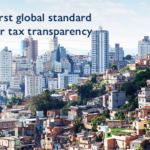International financier and philanthropist George Soros launched a call to governments across the globe for transnational resource extraction companies to ‘Publish what they pay’. Mr. Soros has teamed up with a coalition of over 30 NGOs to insist that oil, gas and mining companies must publish net taxes, fees, royalties and other payments as a condition for being listed on international stock exchanges and financial markets. The coalition includes Amnesty International, CAFOD, Christian Aid, Friends of the Earth, Global Witness, Oxfam, Save the Children and Transparency International.
Relying on companies to disclose information voluntarily has so far failed because they fear being undermined by less scrupulous competitors. The campaign calls for mandatory disclosure backed by legislation so that citizens in developing countries are able to call their governments to account over management of resource revenue
Speaking at the International Institute for Strategic Studies (IISS) on the same day as the G7 Finance Ministers Meeting, Mr. Soros said, Secrecy over state revenues encourages ruling elites to mismanage and misappropriate money rather than invest in long-term development. What we want is very simple: G7 Governments should require transnational resource companies to disclose what they pay for the products of the individual countries in which they operate. This is a real chance to promote good fiscal governance and help tackle worldwide poverty.
Save the Children UK director Mike Aaronson said, Todays call is a major step in the campaign to combat corruption and child poverty. Much of the foreign investment in the worlds least developed countries is in the oil, mining and gas sector. By reporting in those countries on the revenues they pay governments, companies uphold public financial accountability and help create the enabling environment for successful development and child poverty reduction.
Simon Taylor, director of the Nobel Prize nominated NGO Global Witness, argued that getting companies to publish what they pay is central to tackling vested economic interests in many conflicts where political and economic disorder from fighting is used as a cover to plunder resource revenues. He said, Our investigations in war-torn Angola suggest that at least US$1 billion every year for the last five years about one-third of state income went missing from the governments coffers, most of which came from oil. If companies like ChevronTexaco and TotalfinaElf do not reveal how much money they are paying, then it is impossible for Angolan citizens to find out how much is missing.
Mr Julius Ihonvbere from the Africa Centre for Constitutional Development in Nigeria highlighted how unaccountable oil revenues were central to propping up Abachas reign of terror: In Africa, we face a situation where billions of dollars from oil, mining and gas revenues go missing leaving us dependent on international assistance to feed our people. If governments make the bold step to support this campaign, it
has the potential to bring huge improvements to the health and development of the people living in many of the countries in the region. After all, you cannot manage what you cannot measure.



